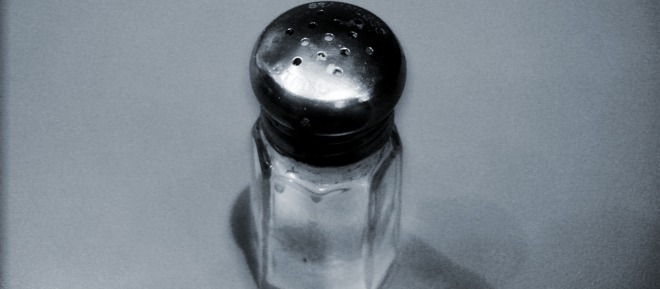
The Statement: “People who eat a high-sodium diet can be putting themselves at risk of high blood pressure that can lead to heart attack and stroke.”—The Chronicle Herald, 08/03/2011
After decades of attempts by policy makers to wean people off the white stuff, it is now taboo to grab the salt shaker at a restaurant and pour it like snow on your dinner. The wisdom that salt is bad is often reinforced in the media. Just this week, the Chronicle Herald ran a piece about how to “shake your salt habit,” as if sodium were akin to tobacco or cocaine. The Globe and Mail also published on a new scare study, which revealed that 70 per cent of infants consume too much salt. Parents were warned that side-effects could be “more serious than having bloated babies… too much salt in an infant can lead to poor kidney development (and kidneys are the organs that help us skim salt from our blood).”
But what kind of evidence do we have to justify the war on salt?
Let’s start with last month’s Cochrane systematic review, which looked at studies that measured the effects of dietary interventions that restricted salt consumption (and not just the effects of restricting salt consumption, as an earlier version of this article stated. Thank you Science-ish reader Scott Gavura.) The review found that giving dietary advice to individuals about reducing salt intake was not effective at actually reducing consumption, which led to the conclusion that there was no clear evidence to show these interventions cut the risk for heart attacks, strokes or death in people with both normal and high blood pressure.
Science-ish contacted the authors of this study, and Dr. Shah Ebrahim got back to us with his take on the findings. “The likely explanation for lack of any big effect on blood pressure and on deaths is that it is very difficult for individuals to stick to a low-salt diet for many years. It is likely that participants in these studies initially followed advice to reduce salt, but were not able to maintain this in the long term, which contributed to the lack of health benefit.”
Another recent (though controversial—see this link) study, published in the May 4 issue of The Journal of the American Medical Association, found that the less salt people consumed, the more likely they were to die of heart disease. Dr. Jan A. Staessen, the study’s lead author, told the New York Times, “If the goal is to prevent hypertension (with lower sodium consumption) this study shows it does not work.”
The tenuousness of the evidence linking reduced salt consumption to good health has been demonstrated in earlier studies, which have concluded that we do not have enough proof to know how eating less salt impacts human health and mortality. For example, a 2002 systematic review published in the British Medical Journal stated that a policy of reduction in salt intake for an entire population “can achieve small reduction in blood pressure across the whole population for sustained period of time […] However, raised blood pressure is only one risk factor for cardiovascular disease and overall clinical benefits (or harms) of a low sodium diet are unclear.”
In 2008, a systematic review entitled, “Effects of low sodium diet versus high sodium diet on blood pressure, renin, aldosterone, catecholamines, cholesterols, and triglyceride” delved into the salt controversy, and came out with similarly muddled conclusions. “Short-term studies show that in people with elevated blood pressure low salt diets lead to drops in blood pressure, but overall harms or benefits are not known.”
Science-ish contacted one of the researchers behind the latter study, Dr. Niels Graudal of the Copenhagen University Hospital, to get some advice about what would happen if a person decided to reduce his or her daily sodium intake by about 50 per cent, from a normal level of some 3.5g (the Canadian average) to about 1.8g. He said that while this dietary change will mean reduced blood pressure in healthy people and those with high blood pressure, it will also activate the sodium conserving endocrine system, resulting in an increase in renin (an enzyme in the kidneys that promotes the production of angiotensin, which are peptides that control blood pressure) and aldosterone (a hormone that regulates salt and water balance in the body). As well, the dietary change will activate the sympathetic nervous system and may increase the levels of triglyceride and cholesterol in the blood. “The effect on blood pressure, although small, may be good, the other effects may be bad,” he said. “Nobody knows what the net effect of all these effects is on morbidity and mortality.”
He also warned that people should be wary of a lesser-known salt hazard: consuming too little. “Very low levels of sodium may lead to hyponatriaemia (low sodium concentration in the blood), which is dangerous and may lead to brain damage and in the worst case death.” He added: “Sodium is one of the most essential components of the body without which life is not possible.”
Science-ish is a joint project of Maclean’s, The Medical Post, and the McMaster Health Forum. Julia Belluz is the associate editor at The Medical Post. Got a tip? Seen something that’s Science-ish? Message her at [email protected] or on Twitter @juliaoftoronto